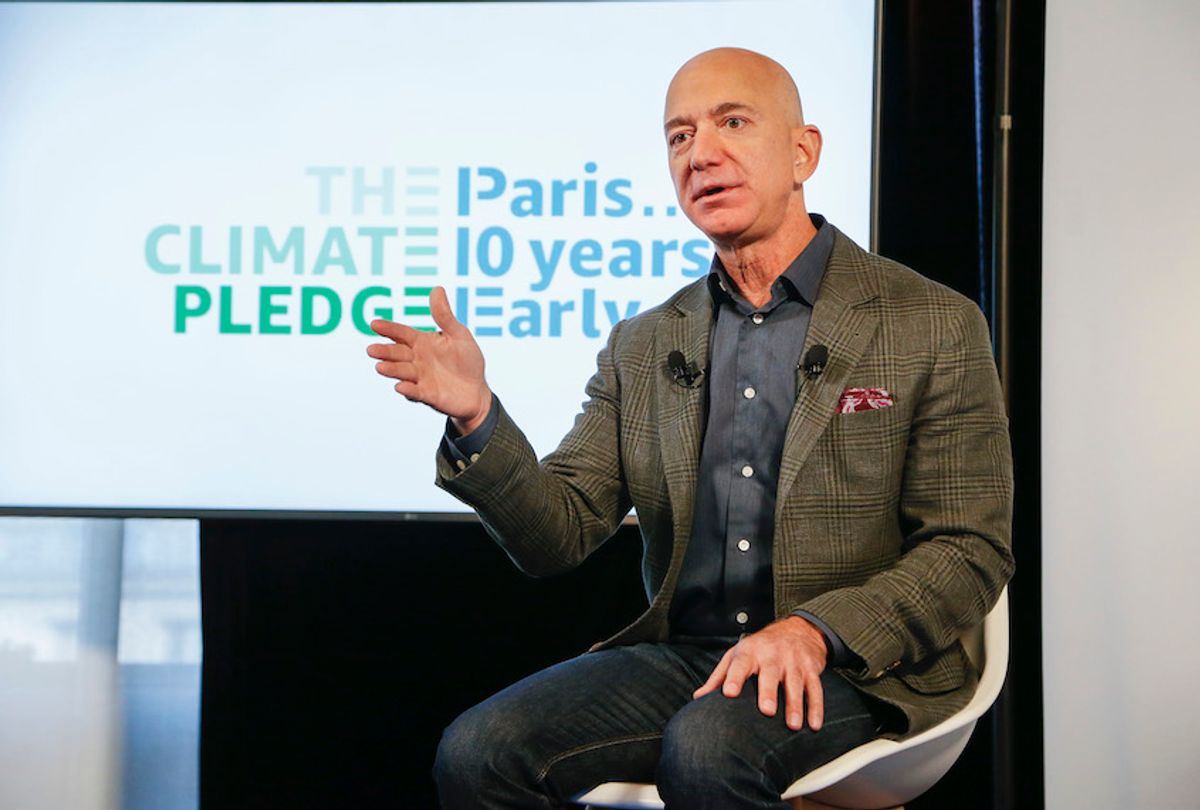The coronavirus pandemic has transformed how Americans get our food. We're no longer going to restaurants; we're limiting our trips to the grocery store. Many of us are, for the first time, ordering groceries online. That's causing huge spikes in demand on e-commerce sites like Amazon, which has moved quickly to expand its grocery delivery services and transform Whole Foods Markets into fulfillment centers for online orders.
But if Amazon consolidating control over yet another sector of the economy during a crisis makes you uncomfortable, Jeff Bezos would like to offer a reframe: Actually, buying your groceries online is better for the planet.
That, at least, is the striking claim made in Bezos' annual letter to Amazon shareholders, which the e-commerce behemoth's CEO released last month. In a section on Amazon's climate impact, Bezos asserts that shopping online is "inherently" more efficient, from a carbon emissions perspective, than going to the store. He references a study conducted by Amazon that found that ordering Whole Foods groceries online reduces the carbon emissions associated with every item in a grocery basket by 43 percent compared with driving to Whole Foods.
So, should you give up your last real reason to enter public spaces and start one-click ordering those potatoes?
Not necessarily. Even though Amazon has yet to publicly release the study in question (we've asked), several experts Grist spoke with said that on average, ordering online often reduces the carbon footprint of grocery shopping. But the word average is key. This finding doesn't scale down to the individual level neatly, and the way you get your food might be very climate-friendly already, no matter what the Amazon man says. What's more, when it comes to the climate impact of our food choices, what we eat is far more important than how we get it. And there are other ethical considerations at play here beyond the carbon footprint of your meal.
According to Shelie Miller, a sustainability researcher at the University of Michigan who has studied the environmental impact of different forms of grocery shopping, when researchers compare shopping online to shopping at a brick-and-mortar outlet, what they're mainly talking about is the so-called "last-mile problem."
For groceries, the last-mile problem refers to how food makes that final leg in its journey from farm to table, whether it's coming from Trader Joe's or an Amazon warehouse. It's a step where a lot of carbon emissions can occur, especially if you're hopping in your SUV and driving 5 miles to pick up ingredients for dinner. In that case, it might be more efficient for a delivery truck to drop off the ingredients for you, especially if that truck is already making dozens of other trips in your neighborhood.
"If you are a person in a single household and you drive to the store and drive back, that is an entire car that is dedicated to a round trip to and from the store," Miller said. While a delivery truck is likely to have higher carbon emissions per mile compared with your personal car, "the miles associated with that grocery cart are much smaller because you have lots of groceries on a single truck," Miller said.
Food that comes straight from a distribution hub also avoids all of the carbon emissions associated with the grocery store itself. Michael Webber, a professor of energy resources at the University of Texas, Austin, notes that grocery stores tend to be "very energy intensive" compared with warehouses. That's because their operators have to create a comfortable 72 degree F environment for shoppers to walk around in while simultaneously keeping perishable food items at a much chillier 38 degrees F.
"If you go to a warehouse, it's much more efficient because there's no customers to make comfortable," Webber said. "Your workers can wear insulated overalls. So you refrigerate the whole thing and it's more efficient." Grocery stores also add another step in the supply chain from farm to consumer that results in additional food waste, another huge climate problem.
It's for all of these reasons that, while Miller hasn't seen the study Bezos references in his shareholder letter, she thinks that its conclusion that online grocery shopping delivers carbon savings over driving to the store "make sense." So does Anne Goodchild, a supply chain and transportation logistics researcher at the University of Washington. The 43 percent emissions reductions figure quoted in the shareholder letter, she said, is "certainly not outside the range of outcomes we've seen in our studies" that looked at the transportation and logistics of grocery delivery.
Webber had a slightly more cautious take. "It depends," he said.
Indeed, while Amazon can tout the benefits of online grocery shopping all it wants, that doesn't mean getting an Amazon Fresh box delivered to your doorstep is the most eco-friendly choice you can make. If you're already walking, biking, or driving a Tesla to the grocery store, getting your eggs and milk dropped off via a truck will likely cause their last-mile emissions to rise. Switching to online shopping might also change your shopping behavior in ways that make it worse for the environment. Perhaps, instead of getting all of your groceries in one carefully planned shopping outing, you start placing lots of smaller orders online, resulting in more truck trips.
Or perhaps your online ordering isn't replacing your personal grocery store trips at all, but merely supplementing them. "This is a huge one," Webber said. "Is this a replacement or an alternative? While we're quarantined it looks like a replacement," but that might not continue to be the case as lockdown restrictions start to ease.
"Amazon has all kinds of data about their own operations," Goodchild said. "What they don't know is how people behave. So it's all based on assumptions."
It's also important to bear in mind that how our food makes that last-mile journey to our doorstep has a much smaller climate impact than the types of food we're eating. In a recent study comparing the environmental impact of meals prepared from Blue Apron meal kits with those same meals made from grocery store ingredients, Miller and her colleagues found that food production was responsible for more than 65 percent of a meal's total carbon footprint. Raising cattle, for instance, requires significant land and resources, which, along with the animals' methane burps, contribute to beef's outsized climate impact. Other types of meat and dairy products also tend to have a high carbon footprint, because they take more energy and resources to produce compared with fruits and vegetables.
Compared with food production, Miller's study found that last-mile emissions, meanwhile, averaged just 4 percent of the carbon footprint for meal kit meals, and 11 percent for grocery store meals.
"Transportation and logistics associated with the last mile are a pretty small overall contribution to the total environmental impact of food," Miller said. The "only possible way" Amazon could have arrived at a 43 percent carbon savings for online delivery, she said, is if the company was only looking at transportation and logistics and not at food production (as was the case in the other studies Goodchild cites).
There are also bigger picture considerations about how the rise in online shoppingwe're witnessing due to coronavirus will impact our food system in the long term. Emily Broad Leib, director of the Harvard Law School Food Law and Policy Clinic, says that while getting groceries delivered seems like the "right direction to go" from a public health standpoint right now, she worries this trend will make it even harder for smaller retailers and family farms to compete. Broad Leib notes that in nearly every state where low-income families can purchase groceries online with food stamps through the Supplemental Nutrition Assistance Program (SNAP), Amazon and Walmart are the only approved retailers.
"A lot more people are already or will be on SNAP in the coming months," Broad Leib said, noting that 37 million Americans were participating in the program in January, the most recent available data. "We're putting a huge thumb on the scale for big retailers."
Whether that allows retail giants to consolidate control over the grocery industry in the wake of the pandemic remains to be seen. But all of our individual food choices in this moment will help determine that, and it's worth seriously considering if we want to live in a world where Amazon dominates yet another sector of consumer spending, particularly given the company's recent failures to protect its frontline workers and its decision to fire dissenting voices who've spoken up about safety concerns and climate change.
It's possible the pandemic will herald a major change in how we get food. What that change looks like ought to depend on more than which company currently has the most efficient delivery system.


Shares